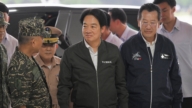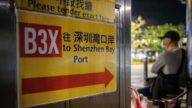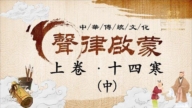【新唐人2013年12月05日讯】美国副总统拜登(Joe Biden)4号抵达北京,进行为期两天的访问。据白宫发言人表示,拜登将直接要求中共领导人,撤销日前划设的“东海防空识别区”。有媒体认为,拜登在东海问题剑拔弩张的时刻访华,有助于改善中美关系,但如果硬要华府在美、日盟国关系与美、中关系之间作出选择,结果只会令中共当局失望。也有媒体指出,由于美国想重返亚太,又和中共有巨大政治和经济利益关系,拜登此行将致力于安抚日本,并稳住中共。
12月4号,拜登抵京访问,中共日前划设的“东海防空识别区”,预料是拜登此行的主要议题。
据香港《苹果日报》报导,拜登3号与日本首相安倍晋三会面,会后拜登表示,美方强烈反对中共划设“东海防空识别区”,中共的片面行动已升高地区紧张情势,增加发生事故和误判的风险。拜登还表示,将向中方提出识别区问题,并表明美国态度。
白宫发言人卡尼2号也表示,拜登将当面告诉中共领导人,美国不接受中共对新宣布的防空识别区所作要求的“合法性”,中共有必要撤销识别区。
不过,北京时政观察人士华颇认为,中共不可能撤销识别区。
北京时政观察人士华颇:“比如对美、日、韩的一些军机,更多的采取一些监视作用,但是不会一个劲,它也会尽量避免擦枪走火的事情发生。因为中国的问题在于国内,而不在于国外。现在来讲,中国和美、日发生冲突,极为不明智。”
据了解,11月23号,中共宣布在包括中、日争端的钓鱼岛上空设立“东海防空识别区,”立即引发日、美、韩等国的不满,美国B-52轰炸机、韩国军机和日本自卫队飞机,不理会中共的“知会”要求,纷纷不予通知进入识别区,公然示威,顿时让中共成为国际上的笑柄。
而拜登选在此时访华,《苹果日报》认为,中共高层自然不会放弃利用美国管控日本的最后努力,由此寻求加强中、美合作、缓和东海局势,因此,拜登的到访,大有可能成为东海问题及中、美关系的转折点。
报导说,事实上,最令北京不满的,并不是美国轰炸机闯入“东海防空识别区”,而是今年6月,中共新上任的领导人习近平在加州安纳伯格庄园,就钓鱼台问题向欧巴马表达中方立场时被打断,中方此后多次要求美方保持中立,但都没有获得美方的理会。
不过,报导也指出,如果硬要华府在美、日盟国关系与美、中关系之间作出选择,结果只会令北京失望。
美国中文杂志《中国事务》总编辑伍凡:“这次拜登在日本的语调不是很高,他在安抚日本,所以,日本心里也毛毛的,究竟美国打什么牌。美国的牌打的是,美国要重返亚太,要平衡中、日之间的关系,也平衡中、美之间的关系,也平衡日、美之间的关系,这是他这次北京访问的最主要目的之一,我想,两边都不想打战,两边有很多共同的利益。”
另据香港《亚洲周刊》引述消息人士的话披露,中共宣布划设“东海防空识别区”,背后深藏的意义在于,中国关注的焦点不再只是钓鱼岛,也不再只是东海中间线的油气田,而是中国突破第一岛链的出海口“宫古海峡”。
伍凡:“识别区有两个目标,近期的目标对着钓鱼岛,想把它拿下来谈判,日本不肯。远期的目标,突破日、美对中共包围的第一岛链,所以它的防空识别区靠近冲绳100多公里,那里有个海口宫古岛,那是为长期的目标。”
不过,《苹果日报》评论指出,中共抛出的“防空识别区”,是三中全会成立的“国安委”所点燃的第一把火,既测试军事、外交、宣传等部门的协调能力,又验证成立“国安委”的必要性,也借此减弱中共党内外对中共总书记习近平集权的批评。
采访/易如 编辑/陈洁 后制/陈建铭
Biden Visits China Amid Air Zone Tensions
U.S. Vice President Joe Biden arrived in Beijing
on December 4 for a two-day visit.
White House spokesperson says that Biden will directly
request Chinese leaders to withdraw the “East China Sea
Air Defense Identification Zone (ADIZ)".
Some media outlets say that Biden’s visit to China at this
time will help ease tensions between the two countries.
However, if Washington is forced to choose between
Japan and China, the result can be only disappointing
to the Chinese regime.
Other media outlets say that the U.S. wants to return
to Asia-Pacific, as they have huge political and economic
interests in China, and Biden’s visit is to placate Japan
and settle China.
On Dec. 4, Biden arrived in Beijing.
The East Sea ADIZ was expected to be
a major topic during Biden’s China trip.
According to Hong Kong’s Apple Daily, Biden met with
Japanese Prime Minister Shinzo Abe on Dec. 3.
Biden said after the meeting that the U.S. strongly opposed
China’s implementation of ADIZ.
The CCP’s recent move has raised tension in the area
and increased the risk of an accident and misjudgment.
Biden said that he would raised the issue of ADIZ
and show the U.S.’s attitude.
On Dec. 2, White House spokesman Jay Carney said that
Biden would tell Chinese leaders to their faces that
the U.S. doesn’t recognize the legality of China’s ADIZ
and “urges China not to implement" it.
Hua Po, Beijing current affairs observer, believes
that China won’t withdraw the ADIZ.
Hua Po: “For example, the military aircraft of the U.S.,
Japan and South Korea are used more for monitoring the area.
They try not to fire their guns,
to not let such an incident occur.
China’s problem is domestically not externally, and I will say
that it is not wise for China to clash with the U.S. and Japan."
Sources say that the Chinese Communist Party (CCP)
announced on November 23 that the ADIZ over the Diaoyu
Islands aroused immediate dissatisfaction from the U.S.,
Japan, South Korea and other countries.
The fact that U.S. B-52 Bombers, South Korean military
aircraft and Japanese Self-Defense Forces ignored China’s
requests, repeatedly entered ADIZ without notice, and openly
protest, suddenly turns the CCP into an international joke.
Regarding Biden’s visit to China at this critical moment,
Apple Daily said that the high-level CCP will certainly not
lose the chance to use the U.S. to restrain Japan, to strengthen
cooperation with the U.S., and ease East Sea tensions.
Thus Biden’s trip is likely the turning point
for the East Sea dispute and Sino-U.S. relations.
The report said that actually, Beijing’s most unhappy issue
is not the U.S. B-52 bomber entering the ADIZ,
it was an incident in June when Xi Jinping visited
the Annenberg Retreat at Sunnylands in the U.S.
When Xi told Obama about China’s stance regarding
the Diaoyu Islands issue, their conversation was interrupted.
Since then, China repeatedly requested the U.S.
to stand neutral, however, the U.S. didn’t respond.
The report also points out that if the U.S. must make choice
between Japan and China, the result will likely disappoint Beijing.
Wu Fan, chief editor of U.S.-based Chinese magazine
China Affairs: “Biden wasn’t talking sharply in Japan.
He was placating Japan.
Thus minds of Japanese leaders didn’t settle.
‘What side is the U.S. playing?’ they wondered.
The U.S. wants to return to Asia-Pacific,
it needs to balance the relations for China and Japan,
to balance relations between China and the U.S.,
and to balance relations between Japan and the U.S.
This is one of Biden’s main purposes of visiting Beijing.
I think neither side want to fight, as both sides
have many mutual interests."
Hong Kong’s Yazhou Zhoukan magazine cited sources that
said the CCP’s announcement of ADIZ has a deep hidden
purpose.
The CCP is no longer just focused on the Diaoyu Islands,
nor on oil fields in middle line of the East Sea,
but on the Miyako Strait, the first chain of Island waterways
for China to access into deep Ocean.
Wu Fan: “ADIZ has two purposes.
First is targeting the Diaoyu Islands.
It wants to possess the islands and attempted to negotiate
but was rejected by Japan.
Second they want to break through the first chain of islands
that are surrounded by the US and Japan.
Thus the ADIZ is 100 kilometers from Okinawa,
at Miyakojima island, that is CCP’s long-term target."
Apply Daily said that the CCP’s launch of ADIZ
is the National Security Commission’s (NSC) first move
since its establishment during the Third Plenum.
It not only tests the cooperation of the military, diplomatic,
propaganda and other sectors, but proves the importance
of setting up the NSC.
It can also have the effect of easing internal criticism
towards Xi Jinping’s centralization.
Interview/YiRu Edit/ChenJie Post-Production/ChenJianming






















